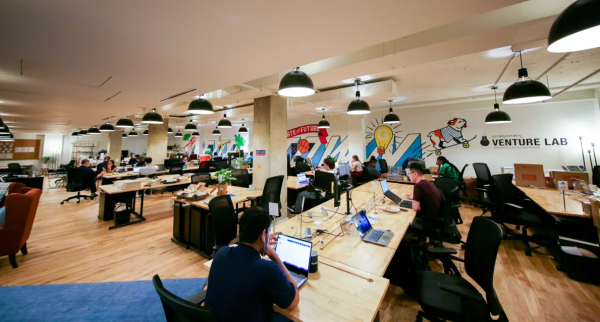On March 26, several student-founded health-related startups pitched their ideas during the inaugural Innovation in Health Care Challenge, created by the Georgetown University Entrepreneurship program within the McDonough School of Business.
Evaluated by a panel of expert judges, three Georgetown-founded startups won the first-place prize of $2,000, followed by three second-place winners earning $1,000 and three third-place winners receiving $500, with all of the awards going toward research, clinical trials and implementation of their health care ideas. The judges evaluated the 24 entries based on the feasibility of their product, team strength and ability and how well their unique innovation incorporated Georgetown’s Jesuit values.
One of the challenge’s first prize winners, Smell Ya Later, was founded to help detect potential cases of Parkinson’s disease, a neurodegenerative disorder that decreases dopamine levels in the brain, causing an array of physical symptoms.
Andrew Tokarski (CAS ’24) a founder at Smell Ya Later, said that although the most common symptoms of Parkinson’s disease are tremors, stiffness and impaired daily functioning, their company’s technology relies on another symptom that is less well known.
“There’s one clinical sign that is often overlooked,” Tokarski said at the event. “People with Parkinson’s typically lose their sense of smell before any other symptoms present.”
Tokarski said that their pitch for affordable, at-home smell tests would allow adults ages 50 to 75 to test themselves for Parkinson’s and other neurodegenerative diseases, including Alzheimer’s disease.
“With Parkinson’s disease, 70% of the affected brain region has already died by the time motor symptoms present and doctors make a diagnosis,” Tokarski said. “It’s extremely important that we catch Parkinson’s disease as early as possible.”
Barbara White, a Georgetown Entrepreneurship mentor for this year’s innovation challenge and founder of The Avoka Group, a Washington, D.C.-based consulting firm, said that clinician burnout and aging were popular themes among the startups, suggesting incoming market trends for the healthcare industry.
“I think we’re going to see more and more solutions around aging and longevity,” White told The Hoya. “There’s a lot of interesting solutions to a similar problem.”

MyMind, another challenge entrant, created an app to combat clinician burnout that streamlines telehealth services and appointments, guided meditation and small-group meetings.
Co-founder Nisha Gupta (MED ’25), said that the team hopes to work directly with hospitals and universities to provide physicians and trainees with MyMind’s services, preventing workplace burnout and promoting positive spaces for mental health in medicine.
“One out of five physicians experience depression during their training, and medical students face depression rates about 15% to 30% higher than the general population,” Gupta said at the event.
Like the Smell Ya Later team, third-place winner MedMate focused on the theme of aging and longevity, offering a “smart box” for medications powered by artificial intelligence that would help patients with heart disease and other chronic illnesses adhere to their medication doses and schedules.
Tamara Ibrahim (MED ’25), MedMate’s founder, identified five major factors for medication nonadherence, including taking many medications at once and patient misunderstanding about the purpose and efficacy of their prescriptions.
“What sets MedMate apart is that it uses machine learning to provide adaptable, customized and interactive patient education and information on the disease and the medication’s purpose,” Ibrahim said at the event.
White commended Georgetown’s students for their unique plans to improve longevity and clinician wellness, citing a need for bright students to bring forward their ideas.
“We tend to think if no one has solved this problem it must be unsolvable, but it’s not,” White said. “That’s why we need these really smart people.”
For the future of sustainability and effective care in our healthcare system, White said that students should continue to foster innovations that push for progress and better care across our communities.
“This is something that touches all of us,” White said. “Even if you’re a really healthy person, you are going to be a consumer of our healthcare system, so the better it operates for everybody, the better off our communities and our society will be.”








